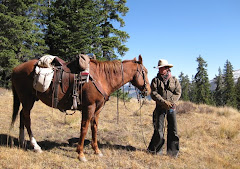 Not too long ago, I read that a true horseman loves horses. Not one breed of horses. Horses. All horses.
Not too long ago, I read that a true horseman loves horses. Not one breed of horses. Horses. All horses.Can we doubt this to be so? We can have personal preferences, and we do, just as one dog owner may prefer a German Shepherd and another a Chihuahua. Is one better than the other? Of course not. We appreciate the differences in dogs as we do in horses. We find what works best for us, our lifestyle, our needs, our wants, and often times, where we are at, both physically and mentally.
With this in mind, as riders, we love to ride. Not just one way. For there is no one right way. Only our personal preferences. Once again, our riding reflects our needs, wants and interests. These may change, evolve. What’s right for me may not work for you, and visa versa. As an example, here: I live in the mountains and trail ride, teach and guide. Would I not be wasting my time and resources by remaining in the arena for hours at a time practicing side passes at different gates when there are infinite lessons to be learned out there on these trails that take me and my horses places the arena never could? Yet watch me and my horse attempt a Piaffe in an arena and you might laugh or cry. Don't worry. I might too.
There is no one right way, no one right practice, no one right breed. Though we as horsemen do have the responsibility to acknowledge wrong ways, as in, anything that might hurt or damage the horse or rider.
Otherwise, we keep our minds open. Open to other riders, at other levels, in other disciplines, from other backgrounds. We acknowledge our knowledge but do not claim it to be the only way.
Or if we do… why? What are we keeping our minds closed to? What are we denying? Why must we feel superior or inferior? As horsemen, do we need to judge our fellow horsemen? And when we do, why do we feel the need and the right to critique our fellow horse lover? Open mouths too easily can replace open minds, when a simple smile or gentle word of encouragement would probably be more than enough. Instead, too often, we hear horsemen pronounce their way as the only way, their path as the only path. The blindness is unfortunate, but the damage done to the recipient of these comments is probably even worse. Would we not be wiser to be silent and allow the other to learn and grow and gain confidence along with knowledge, all the while respecting the differences of the other person?
We expand our knowledge and enrich our life with horses, and in doing so open our minds, our hearts, and our lives.
I recommend reading the article, “Cowboy Dressage: An Evolution in Horsemanship” by Jack Brainard in the September/October 2009 issue of Eclectic Horseman. Here is a master horseman, at age 75, who shows more insight and wisdom because of and through his open mind than many half his age, with half his experience. To quote Mr. Brainard, “Horsemanship does not have to be a one-way staid method of training a horse. I think there is such a thing as creative development…”
May we learn from those wiser than us. But remember: the wisest often speak the softest. The old wisdom is often true: the loudest mouths have the least to say.
Be creative. Be constructive. Be our personal best, and do the best we can with our personal choices. And remember, the person riding next to you came from a very different place, and is headed in a very different direction. Tip your hat, and ride on in a positive way. We are all horsemen. We all share the goal of being the best rider and horse handler we can be. Our journeys are all different. May we therefore look upon our fellow horseman, whoever he or she may be, at whatever level, following whatever path, with kindness and encouragement. Is that such a crazy concept?













